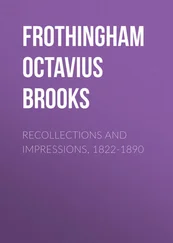Edmund Gosse - Aspects and Impressions
Здесь есть возможность читать онлайн «Edmund Gosse - Aspects and Impressions» — ознакомительный отрывок электронной книги совершенно бесплатно, а после прочтения отрывка купить полную версию. В некоторых случаях можно слушать аудио, скачать через торрент в формате fb2 и присутствует краткое содержание. Жанр: Критика, foreign_antique, foreign_prose, на английском языке. Описание произведения, (предисловие) а так же отзывы посетителей доступны на портале библиотеки ЛибКат.
- Название:Aspects and Impressions
- Автор:
- Жанр:
- Год:неизвестен
- ISBN:нет данных
- Рейтинг книги:4 / 5. Голосов: 1
-
Избранное:Добавить в избранное
- Отзывы:
-
Ваша оценка:
- 80
- 1
- 2
- 3
- 4
- 5
Aspects and Impressions: краткое содержание, описание и аннотация
Предлагаем к чтению аннотацию, описание, краткое содержание или предисловие (зависит от того, что написал сам автор книги «Aspects and Impressions»). Если вы не нашли необходимую информацию о книге — напишите в комментариях, мы постараемся отыскать её.
Aspects and Impressions — читать онлайн ознакомительный отрывок
Ниже представлен текст книги, разбитый по страницам. Система сохранения места последней прочитанной страницы, позволяет с удобством читать онлайн бесплатно книгу «Aspects and Impressions», без необходимости каждый раз заново искать на чём Вы остановились. Поставьте закладку, и сможете в любой момент перейти на страницу, на которой закончили чтение.
Интервал:
Закладка:
Henry James wrote, between 1889 and 1894, seven or eight plays, on each of which he expended an infinitude of pains and mental distress. At the end of this period, unwillingly persuaded at last that all his agony was in vain, and that he could never secure fame and fortune, or even a patient hearing from the theatre-going public by his dramatic work, he abandoned the hopeless struggle. He was by temperament little fitted to endure the disappointments and delays which must always attend the course of a dramatist who has not conquered a position which enables him to browbeat the tyrants behind the stage. Henry James was punctilious, ceremonious, and precise; it is not to be denied that he was apt to be hasty in taking offence, and not very ready to overlook an impertinence. The whole existence of the actor is lax and casual; the manager is the capricious leader of an irresponsible band of egotists. Henry James lost no occasion of dwelling, in private conversation, on this aspect of an amiable and entertaining profession. He was not prepared to accept young actresses at their own valuation, and the happy-go-lucky democracy of the "mimes," as he bracketed both sexes, irritated him to the verge of frenzy.
It was, however, with a determination to curb his impatience, and with a conviction that he could submit his idiosyncrasies to what he called the "passionate economy" of play-writing, that he began, in 1889, to dedicate himself to the drama, excluding for the time being all other considerations. He went over to Paris in the winter of that year, largely to talk over the stage with Alphonse Daudet and Edmond de Goncourt, and he returned to put the finishing touches on The American , a dramatic version of one of his earliest novels. He finished this play at the Palazzo Barbaro, the beautiful home of his friends, the Daniel Curtises, in Venice, in June, 1890, thereupon taking a long holiday, one of the latest of his extended Italian tours, through Venetia and Tuscany. Edward Compton had by this time accepted The American , being attracted by his own chances in the part of Christopher Newman. When Henry James reappeared in London, and particularly when the rehearsals began, we all noticed how deeply the theatrical virus had penetrated his nature. His excitement swelled until the evening of January 3rd, 1891, when The American was acted at Southport by Compton's company in anticipation of its appearance in London. Henry James was kind enough to wish me to go down on this occasion with him to Southport, but it was not possible. On the afternoon of the ordeal he wrote to me from the local hotel: "After eleven o'clock to-night I may be the world's – you know – and I may be the undertaker's. I count upon you and your wife both to spend this evening in fasting, silence, and supplication. I will send you a word in the morning, a wire if I can." He was "so nervous that I miswrite and misspell."
The result, in the provinces, of this first experiment was not decisive. It is true that he told Robert Louis Stevenson that he was enjoying a success which made him blush. But the final result in London, where The American was not played until September, 1891, was only partly encouraging. Henry James was now cast down as unreasonably as he had been uplifted. He told me that "the strain, the anxiety, the peculiar form and colour of the ordeal (not to be divined in the least in advance)" had "sickened him to death." He used language of the most picturesque extravagance about the "purgatory" of the performances, which ran at the Opera Comique for two months. There was nothing in the mediocre fortunes of this play to decide the questions whether Henry James was or was not justified in abandoning all other forms of art for the drama. We endeavoured to persuade him that, on the whole, he was not justified, but he swept our arguments aside, and he devoted himself wholly to the infatuation of his sterile task.
The American had been dramatized from a published novel. Henry James now thought that he should do better with original plots, and he wrote two comedies, the one named Tenants and the other Disengaged , of each of which he formed high expectations. But, although they were submitted to several managers, who gave them their customary loitering and fluctuating attention, they were in every case ultimately refused. Each refusal plunged the dramatist into the lowest pit of furious depression, from which he presently emerged with freshly-kindled hopes. Like the moralist, he never was but always to be blest. The Album and The Reprobate – there is a melancholy satisfaction in giving life to the mere names of these stillborn children of his brain – started with wild hopes and suffered from the same complete failure to satisfy the caprice of the managers. At the close of 1893, after one of these "sordid developments," he made up his mind to abandon the struggle. But George Alexander promised that, if he would but persevere, he really and truly would produce him infallibly at no distant date, and poor Henry James could not but persevere. "I mean to wage this war ferociously for one year more," and he composed, with infinite agony and deliberation, the comedy of Guy Domvile .
The night of January 5th, 1895, was the most tragical in Henry James's career. His hopes and fears had been strung up to the most excruciating point, and I think that I have never witnessed such agonies of parturition. Guy Domvile – which has never been printed – was a delicate and picturesque play, of which the only disadvantage that I could discover was that instead of having a last scene which tied up all the threads in a neat conclusion, it left all those threads loose as they would be in life. George Alexander was sanguine of success, and to do Henry James honour such a galaxy of artistic, literary, and scientific celebrity gathered in the stalls of the St. James's Theatre as perhaps were never seen in a London playhouse before or since. Henry James was positively storm-ridden with emotion before the fatal night, and full of fantastic plans. I recall that one was that he should hide in the bar of a little public-house down an alley close to the theatre, whither I should slip forth at the end of the second act and report "how it was going." This was not carried out, and fortunately Henry James resisted the temptation of being present in the theatre during the performance. All seemed to be going fairly well until the close, when Henry James appeared and was called before the curtain – only to be subjected – to our unspeakable horror and shame – to a storm of hoots and jeers and catcalls from the gallery, answered by loud and sustained applause from the stalls, the whole producing an effect of hell broke loose, in the midst of which the author, as white as chalk, bowed and spread forth deprecating hands and finally vanished. It was said at the time, and confirmed later, that this horrible performance was not intended to humiliate Henry James, but was the result of a cabal against George Alexander.
Early next morning I called at 34 De Vere Gardens, hardly daring to press the bell for fear of the worst of news, so shattered with excitement had the playwright been on the previous evening. I was astonished to find him perfectly calm; he had slept well and was breakfasting with appetite. The theatrical bubble in which he had lived a tormented existence for five years was wholly and finally broken, and he returned, even in that earliest conversation, to the discussion of the work which he had so long and so sadly neglected, the art of direct prose narrative. And now a remarkable thing happened. The discipline of toiling for the caprices of the theatre had amounted, for so redundant an imaginative writer, to the putting on of a mental strait-jacket. He saw now that he need stoop no longer to what he called "a meek and lowly review of the right ways to keep on the right side of a body of people who have paid money to be amused at a particular hour and place." Henry James was not released from this system of vigorous renunciation without a very singular result. To write for the theatre the qualities of brevity and directness, of an elaborate plainness, had been perceived by him to be absolutely necessary, and he had tried to cultivate them with dogged patience for five years. But when he broke with the theatre, the rebound was excessive. I recall his saying to me, after the fiasco of Guy Domvile , "At all events, I have escaped for ever from the foul fiend Excision!" He vibrated with the sense of release, and he began to enjoy, physically and intellectually, a freedom which had hitherto been foreign to his nature.
Читать дальшеИнтервал:
Закладка:
Похожие книги на «Aspects and Impressions»
Представляем Вашему вниманию похожие книги на «Aspects and Impressions» списком для выбора. Мы отобрали схожую по названию и смыслу литературу в надежде предоставить читателям больше вариантов отыскать новые, интересные, ещё непрочитанные произведения.
Обсуждение, отзывы о книге «Aspects and Impressions» и просто собственные мнения читателей. Оставьте ваши комментарии, напишите, что Вы думаете о произведении, его смысле или главных героях. Укажите что конкретно понравилось, а что нет, и почему Вы так считаете.












